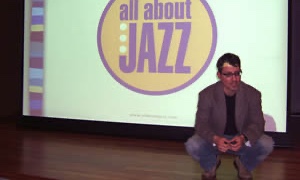Home » Jazz Articles » AAJ PRO » Motivation
Motivation
Musicians, like anyone else, find themselves in situations where they must assume a variety of roles. These roles have been produced by the influence of various motivations. Not all roles are comfortable. Some, indeed, may be—or at least appear to be—contradictory.
The aspiring musician is motivated to begin music by a number of factors. Some can be easily isolated and identified. Others are buried either in the subconscious or they are hybrid motivations and thus difficult to separate. One may begin to learn about or play music because of a lack of alternatives for time or energy. Though this is not an impressive reason to begin music, it is at least a beginning. Others approach music from a social point of view. Participation in music is often the starting point of friendships and various social involvements. Some approach it as a means for acquiring status, money, influence or power. Still others stumble into it as if by accident. Why or the way in which one gets involved in music is immaterial; that the involvement begins is the one significant fact.
The question becomes: "Will that involvement grow?" Will it develop beyond the level of its initial motivation? There is no way to predict what will motivate a particular individual to greater involvement. What is it about music that captures the imagination of one and leaves another disinterested? The difference can often be traced to a teacher, an approach, an attitude. Since we know that potential lies at different levels in different individuals, it is easy to see why some potential goes undeveloped. A lack of endurance or determination can cause anyone to abandon the pursuit of music. This abandonment might occur just before the imagination is reached. This does not negate the fact that the potential exists. It merely stops progressing before the individual feels development. This, to me, is a tragedy. It can be measured, not only in terms of what the individual lost, but, potentially, in what many others lost who will never be touched by that person's music. This is not to imply that all who endure have a great talent to contribute. However, everyone can make a contribution based upon their own individuality.
But, then, no one is looking for or expecting mass numbers. The focus is on individuals but which individuals? As teachers, we never know. Thus, we must not neglect even one student. We never will know what he might have accomplished. If approached more callously, we might say that if he does not endure, he lacked something essential to succeed. This is too much of a simplification since individuals are motivated in different directions by such a complexity of circumstances.
It is probably true that those endowed with the greatest abilities tend to succeed regardless of their circumstances. However, not everyone has this degree of endowment. And there is no way to measure the depth of it.
It is quite common to be enthused over a student who learns or remembers easily or who has excellent physical coordination. These students often prove disappointing if these abilities lack depth. Too often they are lying on the surface of a student's potential. But the deeper nature of these attributes remains undeveloped because the student lacks the motivation or the "talent" or that something to take him any further.
Tags
PREVIOUS / NEXT
Support All About Jazz
 All About Jazz has been a pillar of jazz since 1995, championing it as an art form and, more importantly, supporting the musicians who make it. Our enduring commitment has made "AAJ" one of the most culturally important websites of its kind, read by hundreds of thousands of fans, musicians and industry figures every month.
All About Jazz has been a pillar of jazz since 1995, championing it as an art form and, more importantly, supporting the musicians who make it. Our enduring commitment has made "AAJ" one of the most culturally important websites of its kind, read by hundreds of thousands of fans, musicians and industry figures every month.

























